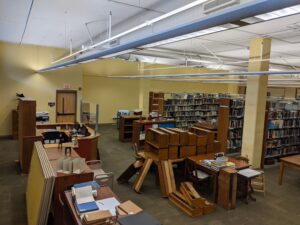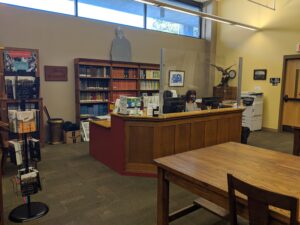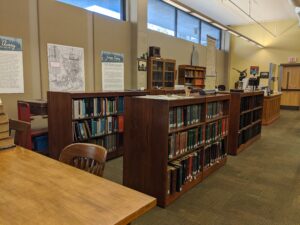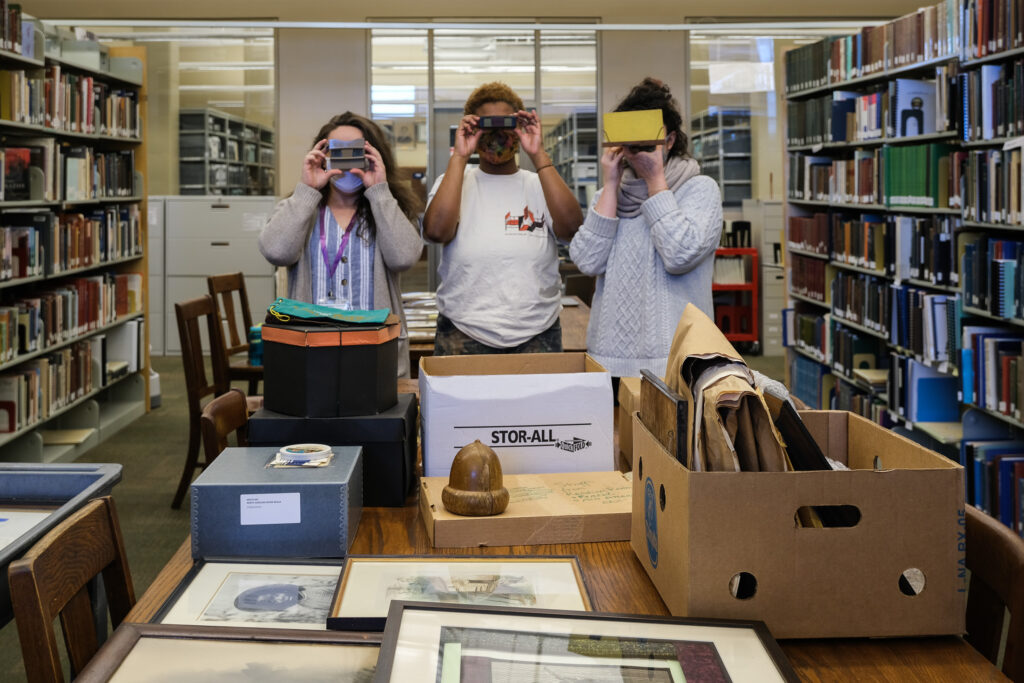This article appeared in the Volume 2, Issue 3 Winter 2021 issue of the Appalachian Curator. Click here to view a PDF of the full issue.
By Katherine Calhoun Cutshall
This article appeared in the Volume 2, Issue 3 Winter 2021 issue of the Appalachian Curator.
When I think back on the last year, I often feel like I was better prepared than others for the changes brought by 2020. When I submitted this article for the January 2020 Curator my colleagues and I were already bracing for transformation at our institution. Buncombe County hired a new, progressive library director in fall 2018, and in December 2019 a most valuable colleague with more than 25 years of experience with our collection retired. Pandemic or not, change was on the horizon.
The previous article discussed the community-driven archives programs our library has facilitated over the past several years and our plans to ramp up our newest effort, the Black Asheville History Project. Just as we were gearing up for a year of large community gatherings, everything came to a sudden halt. Slowly, it became clear that there would be no History Harvest in 2020. Instead of planning events and working with collections, I was at home helping the Buncombe County Emergency Operations team keep up with rapidly evolving information about Covid-19.
By late April, staff were able to return to the library in a limited capacity. About the same time, Lydia See, founder of Engaging Collections, reached out wondering how Engaging

Collections (EC) could partner with our archive despite public health restrictions. EC’s mission is to collaborate with libraries, museums, and special collections to “fund underrepresented artists to share untold narratives through creative initiatives that build community.” Together with Lydia and EC Artist in Residence, Honey Simone, we began brainstorming ways to bring art and equity to our archives space. By May, we landed on a small installation curated by Simone in the North Carolina Collection’s reading room called the Carolina Record Shop.
Days later, the murder of George Floyd and its aftermath completely changed our plans. Our conversations shifted away from small aesthetic changes, instead we began to identify all of the systemic barriers between our archives and the communities we serve, especially communities of color. The size and scope of the Carolina Record Shop project shifted and changed quickly. By the late summer, our goal grew beyond a small installation to a complete reimagination of our archives’ reading room and disruption of traditional library and archives systems. We wanted to create a space where everyone, especially traditionally marginalized folks, could feel comfortable and supported accessing their own history.
Over the past year a team including library staff, EC’s Lydia See, Artist in Residence Honey Simone, and two Research Fellows, have made a series of significant changes to improve equity and access in our library. Both environmental and systemic changes are working together to help us reach our goal of creating a welcoming, accessible, and engaging special collections library.
Overhauling Existing Library Systems to Promote Equity and Access
Library staff worked alongside community partners to identify ways to make discovery and navigation of resources more accessible for all of our patrons. The following are just a few of the changes we made to library systems to encourage equity, inclusion, and access.
Name Change
One of the first issues our team considered was the name of our archives. We wondered: Does the name “North Carolina Room” provide the public with an adequate description of our services? Does it inspire curiosity in community members that have never visited the archive? After deliberation with Buncombe County administration, and seeking input from patrons, we changed our name to Buncombe County Special Collections (BCSC). The change brought us in line with county-wide branding and made it more apparent that our library is part of the Buncombe County system. Besides creating brand continuity, we liked the idea that patrons would know, just by hearing our name, that we provide specialized services.

Ditching Dewey
The Dewey Decimal System was just not working for BCSC patrons and staff. While useful in most public library settings, the system doesn’t work well for our relatively small, specialized collection. When evaluating our stacks, we discovered that more than half of the books fell into just three Dewey classifications. This made locating materials cumbersome for staff and patrons. In fall 2020 we took the plunge and “genrefied” our open stacks to promote browsing and discovery of resources. Throughout the process of subject classification, BCSC staff weeded hundreds of titles, moved rare and fragile books and manuscripts into secure storage, and refocused the reference collection on Buncombe County, western North Carolina, and Southern Appalachia. During the weeding process, BCSC staff discarded and re-homed the majority of reference materials relating to NC Piedmont, Coastal Plain, and Outer Banks communities. We also created a section called “The Literature of Prejudice” to contextualize titles in our collection published to promote White Supremacy, Anti Semitism, and Scientific Racism (For example, Thomas Dixon Jr.’s The Leopard’s Spots).
New Collection Development and Access Policies
BCSC’s collection development plan and access policies had not been updated in more than a decade. Throughout 2020 BCSC staff worked with the Library Director and community members to revise these policies. Some significant changes include a move away from requiring a photo ID to access special collections, and changing our collection development policy to refocus our reference stacks on western North Carolina and nearby Appalachian counties in neighboring states.
Improved Digital Accessibility
Finally, one of the biggest changes to library and archives systems at BCSC is an upcoming migration to new archives management software. The move to a new ILS (Lucidea’s ArchivEra) will help BCSC staff better organize our online finding aids and digital archives, ultimately providing patrons with an improved user experience while browsing collections online. The plan will also consolidate our web presence. When this project is complete our online database will merge with our blog, HeardTell, to become a single local history hub.
“When you see us, see us,” Centering BIPOC Narratives in the Archives Reading Room

In a January 2021 interview with the Mountain Xpress, Artist Honey Simone remembered when she first visited the Special Collections room, she didn’t see herself reflected anywhere. She explained, “that’s a common experience for a lot of Black Americans. You just never really see yourself in places where you want to see yourself.” To rectify this issue of visual representation Simone and her team worked together to modify the design and atmosphere of the BCSC reading room; creating a space that is inviting to, and reflective of, Buncombe County’s diverse communities. The team tackled three distinct focus areas to complete the transformation.
Refreshing the Reading Room
One of the first goals of the redesign project was to make the space feel more open, bright, and comfortable. Simone worked with BCSC staff to make intentional, practical changes to the functionality of our public space. With a few changes to the furniture arrangement (made possible by weeding the reference stacks) and paint color, the atmosphere completely transformed. The team also brought in several pieces of comfy furniture, some truly beautiful (fake!) plants, and selected new images for semi-permanent display.
The Carolina Record Shop
With the goal to create a space in the room that centers the stories of Black mountaineers, Simone took inspiration from the legacy of Black-owned record stores. These shops served as safe, cultural and social spaces for Black youth throughout the 1960s and 1970s. Her installation inside the Buncombe County Special Collections reading room invites visitors to flip through archival “records” as a tactile method of discovering the history of Buncombe County’s Black communities. Simone hopes the interactive exhibit will “feel joyful, [like a] celebratory exploration of Asheville’s rich and dynamic Black legacy, and an instigation to consider Black Asheville’s resiliency and future.”
Buncombe County Timeline and Land Acknowledgement Statement
As part of the redesign process, Simone wanted to ensure that there was some way for visiting patrons to visualize the untold stories hidden in the BCSC archives. This resulted in a large timeline exhibit that is still in progress, but will be complete by summer 2021. The timeline exhibit begins with a land acknowledgement statement, a paragraph that recognizes that our library is situated on land traditionally owned by the Cherokee people and their ancestors, and the systemic erasure of American Indian and Black American narratives from primarily white-dominated memory institutions. Other pieces of the exhibit highlight consequential milestones in Buncombe County’s history, like the Rutherford Expedition and the closure of Asheville Motor Speedway.
Although 2020 was a tragic year in so many ways, I am beyond grateful that it provided the space and time required for this thoughtful transformation. As public health restrictions ease, BCSC is moving forward with reopening our space with limited service hours. Though we are just now beginning to welcome patrons back into our reading room, we’re already feeling confident about folks’ reactions to the new space. This challenge has the BCSC team energized and looking forward to what lies ahead.
Katherine Calhoun Cutshall is Collection Manager at Buncombe County Special Collections, Asheville, NC

2 Comments
Cynthia P Justice
I think this sounds wonderful, exciting for all of us. Thank you for all of the tedious, but interesting, work…I do hope you sent the material we didn’t need on the Piedmont and Coastal Plain on to them!
Pingback: